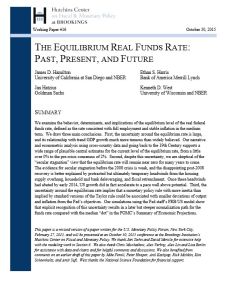Rejoignez getAbstract pour lire le résumé !

Rejoignez getAbstract pour lire le résumé !
James D. Hamilton, Jan Hatzius, Ethan S. Harris and Kenneth D. West
The Equilibrium Real Funds Rate
Past, Present, and Future
Brookings Institution, 2015
Aperçu
This compelling, detailed analysis examines where the US federal funds rate is headed.
Recommendation
The Federal Reserve has kept an extraordinarily accommodative interest rate policy since the Great Recession, with the benchmark federal funds rate holding close to zero. Only in December 2015 did the Fed raise the rate, but only by 0.25%. Determining the equilibrium fed funds rate going forward is a complex undertaking, considering the rate’s relationship to the proper balance between full employment and price stability. Is a low real fed funds rate on the horizon for the foreseeable future, and if so, is this the “new neutral,” just as slower economic growth is the new normal? getAbstract recommends this highly sophisticated academic report to astute readers interested in a deep-dive analysis of equilibrium interest rates.
Summary
About the Authors
James D. Hamilton is an econometrician at the University of California at San Diego. Jan Hatzius is chief economist at Goldman Sachs. Ethan S. Harris heads North America economics at Bank of America Merrill Lynch. Kenneth D. West is an economics professor at the University of Wisconsin.




















Comment on this summary